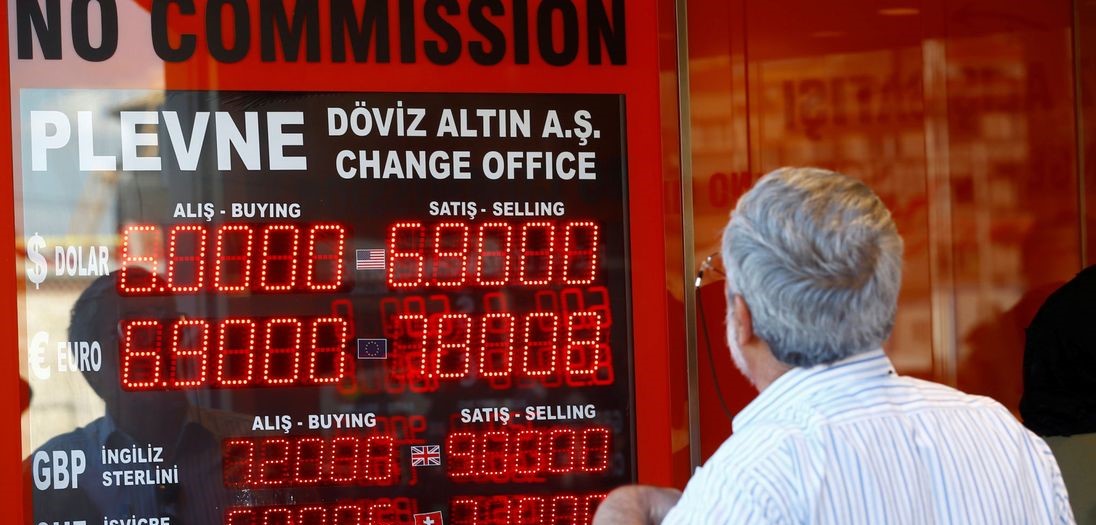Turkey raises interest rates to 24%
September 14, 2018 | Expert Insights

The lira has risen against the dollar after Turkey's central bank hiked interest rates to 24% on Thursday - the biggest increase in President Tayyip Erdogan's 15-year rule. Turkey comprises 1% of global GDP.
Background
Turkey’s lira had earlier fallen to a record low against the dollar and its $900 billion economy is teetering on the edge of a full-blown financial crisis. The US doubled the tariffs on steel and aluminium, which further triggered the currency fall. Recep Tayyip Erdoğan, Turkey’s president, remained defiant and accused foreign interests of waging an economic war against Turkey and pledging trade measures to reduce reliance on the dollar and US markets.
The value of Turkey's currency had nosedived since January and it has lost more than 34% of its value against the dollar. It hit a record low of reaching 6.30 to the dollar, although it has since recovered slightly. The stock market has also fallen 17%, while government borrowing costs have risen to 18% a year. Meanwhile, inflation in Turkey has hit 15%. Investors are worried that Turkish companies that borrowed heavily to profit from a construction boom may struggle to repay loans in Dollars and Euros, as the weakened lira means there is now more to pay back.
Relations between the US and Turkey have certainly not been at its best in recent months, primarily due to disagreements on Syria. The latest dispute was over the decision by a Turkish court to extend the detention of Andrew Brunson, an American pastor accused of espionage for Kurdish militants and the Gülen movement, a group accused of masterminding the 2016 coup. Turkey had also pledged to buy the S-400 missile defence system from Russia, a step that strained its ties with the broader NATO alliance. When Donald Trump announced economic sanctions against Iran last week, Erdoğan pointedly refused to take part.
Read more of our extensive analysis of the Turkish currency crisis and the sanctions between the US and Turkey here and here
Analysis
The Central Bank of Turkey increased its benchmark interest rate on Thursday to 24%, a hike of 625 basis points from the previous rate of 17.75%. The Turkish lira jumped more than 2% on the news, firming to around 6.1 against the dollar.
The move, which exceeded market expectations of an increase of between 300 and 400 basis points, boosted the lira and saw Turkish sovereign dollar bonds gain across the curve to their highest level since the end of August. The lira touched as high as 6.0030 against the dollar immediately following the announcement. The move came despite Mr. Erdogan repeating his opposition to high-interest rates earlier in the day. He has repeatedly blamed the central bank for high inflation, which hit almost 18% last month, its highest level since 2003.
Mr. Erdogan, who has called himself an "enemy of interest rates", chose his son-in-law, Berat Albayrak, as finance minister in July. Phoenix Kalen at Societe Generale said the market was both pleased and confused by the bank's move.
Piotr Matys at Rabobank said Turkey also needed to resolve its trade dispute with the US and rebalance the economy away from big infrastructure projects and consumer spending. On Thursday Turkey banned the use of foreign currencies in the country's property market.
The lira's fall amplifies other danger spots for the Turkish economy: as global interest rates rise and the dollar strengthens, Turkey's foreign currency-denominated debt — which amounts to roughly 50% of its gross domestic product (GDP) — becomes increasingly painful to finance. Its current account deficit in the first six months of 2018 hit $31.2 billion, up nearly $10 billion from the same period last year.
Several emerging markets have confronted the same struggles, dogged by a strengthening U.S. dollar that makes it more difficult for countries such as Turkey to pay back hefty external debt. The lira's erratic moves have knocked hundreds of points off global markets in single trading days and triggered sell-offs across emerging markets.
This included Argentina, which holds the distinction of having the world's highest interest rate. Late last month, South America's second-largest economy saw that rate jump to a staggering 60% in a bid to ease investor fears. Such fears have played out in other countries and sent currencies in India, Indonesia and South Africa into recent slides of their own.
Counterpoint
But Cristian Maggio, EM strategist at TD Securities, said the central bank did not go far enough, because inflation was likely to rise beyond 20%, and “higher inflation will require even higher rates”.
Turkey has struggled with soaring inflation that reached almost 18% in August. The lira, battered by a US-Turkey dispute as well as concerns about the health of the Turkish economy, has lost roughly 38% of its value since the start of the year.
Assessment
Our assessment is that an economic turbulence in Turkey which is ensconced at the crossroads of Asia and Europe, with a population of 80 million, and home to both NATO's second-largest military and more than 3.5 million Syrian refugees, would be an event that will pose a significant geopolitical challenge. We feel that the lira will remain under pressure in the coming months owing to tightening global liquidity conditions and tensions between Turkey and the U.S.








Comments